Do dental implants hurt? This is a common concern for anyone considering dental implants as a solution to tooth loss. There’s no denying that the idea of undergoing surgery can be daunting, especially when it involves a sensitive area like your mouth. Patients often wonder about the pain associated with the procedure, leading them to ask: are dental implants painful? Does a dental implant hurt? And how painful are teeth implants? While dental implant surgery does involve some discomfort, advancements in modern dentistry have made the process significantly more bearable. Understanding what to expect during the process, from placement to recovery, can help alleviate many fears and concerns.
When you delve deeper into the subject of tooth implant pain, it becomes evident that various factors contribute to the overall experience. Many patients report mild sensations of pressure rather than sharp pain. Moreover, post-operative soreness can occur, but this varies widely among individuals. In the following sections, we will explore the different aspects of pain associated with dental implants, offering insights and practical information to help you navigate your journey toward restoring your smile.
Pain during the implant placement
The initial phase of getting dental implants involves surgical intervention, which naturally raises questions regarding pain levels during the process. However, understanding the mechanisms in place to manage pain can help ease anxiety surrounding the procedure.
Anesthesia and pain management
Prior to the actual placement of the implant, your dentist will prioritize your comfort by administering local anesthesia. This is critical as it numbs the targeted area, blocking pain signals from reaching your brain. The effectiveness of these anesthetics means that while you may feel pressure or minor sensations during the procedure, any sharp or severe pain should be largely absent.
For patients who experience dental anxiety or for whom the procedure is extensive, sedation dentistry may be recommended. This ranges from oral sedatives that help to calm nerves, to intravenous (IV) sedation, which can make you feel drowsy enough to not fully register the procedure taking place. This level of preparation ensures that most patients meet the procedure with a sense of calm rather than fear, allowing them to focus on the end goal—a successful restoration of their smile.
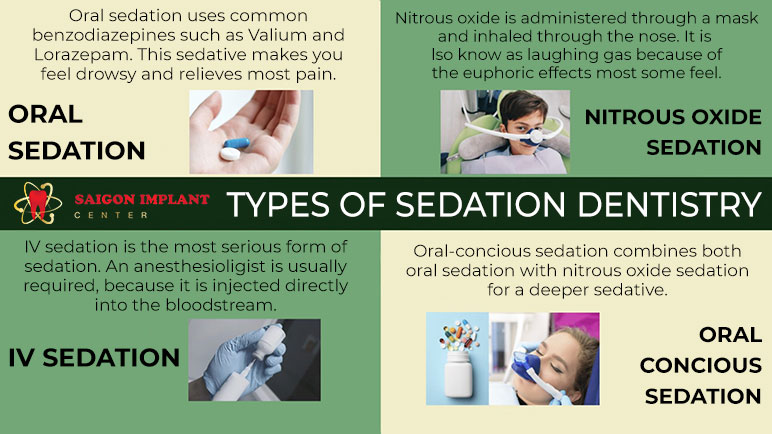
Post-operative discomfort
After the surgery concludes, it’s common for patients to experience a range of discomfort levels. Generally, the soreness you might feel is akin to what one would encounter after having a tooth extracted. Expect tenderness around the implant site, swelling, and possibly bruising. These symptoms arise from the body’s natural healing response and usually subside within a few days.
Patients should anticipate some level of discomfort that can be managed effectively with over-the-counter pain relievers. Each person’s experience varies; some may find the discomfort minimal, while others could feel soreness more acutely. Knowing what to anticipate can better prepare you for the post-surgical stage, allowing you to establish a suitable pain management plan along with your dentist.
Factors onfluencing pain levels
Understanding why some patients experience varying levels of discomfort helps demystify the pain associated with dental implants. Several unique factors contribute to each individual’s pain experience.
Individual pain tolerance
Pain tolerance is an incredibly subjective aspect of human experience. What feels painful to one person may barely register with another. Therefore, some individuals may state, “does a dental implant hurt?” with certainty, while others answer with a resounding “no.”
Pain tolerance can be affected by numerous elements including genetics, personal experiences with pain, and even mental preparedness going into the procedure. Approaching the experience with a positive mindset can grant patients a greater sense of control, reducing perceived pain levels. Your awareness of this fact can empower you to engage in relaxation techniques or seek mindfulness practices before and during the treatment, further influencing your level of discomfort.
Complexity of the procedure
Another significant factor influencing pain is the complexity of the dental implant procedure itself. Simple cases, such as replacing a single tooth in a healthy jawbone, typically result in less discomfort compared to complicated scenarios requiring additional procedures such as bone grafting or sinus lifts.
These advanced procedures involve more extensive manipulation of the gum tissue and bone structure, which can lead to a higher degree of post-operative discomfort. As a patient, discussing the specifics of your case with your dentist can provide clarity on what to expect regarding pain levels. This conversation allows you to better prepare for potential discomfort and consider additional pain management strategies if necessary.
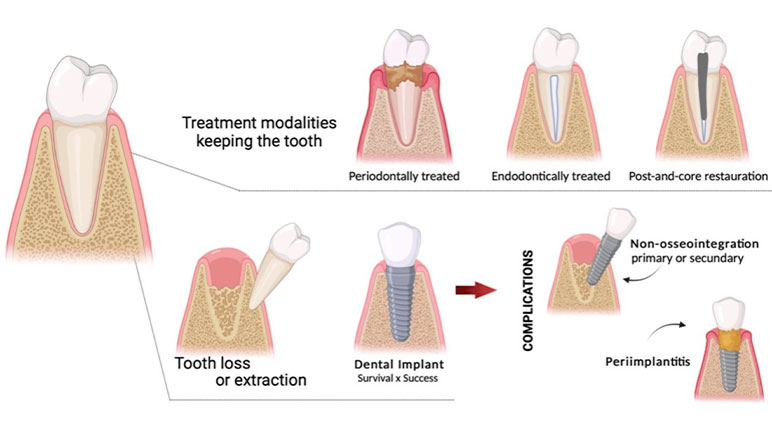
Oral health and existing conditions
Your overall oral health plays a crucial role in potential post-operative pain. Existing conditions, such as gum disease or diabetes, can complicate healing and heighten pain experiences. For instance, patients with untreated gum disease may find that their bodies react differently to surgery due to inflammation present in the gums.
Conversely, maintaining excellent oral hygiene leading up to the procedure can mitigate complications and facilitate faster healing. If you’re considering dental implants, addressing existing dental issues before the procedure is vital. Ensure that you communicate any underlying health conditions to your dentist so they can tailor the approach accordingly, potentially lowering the chances of excessive pain.
Pain medication and management
The effective management of pain following dental implant surgery is paramount to ensuring a smooth recovery. Here are several options available to assist in easing discomfort during the healing process.
Over-the-counter pain relievers
For mild to moderate pain, over-the-counter medications are often the first line of defense. Medications like ibuprofen or acetaminophen can effectively reduce discomfort and manage inflammation. Consult your dentist for personalized recommendations concerning dosage and frequency.
In addition to providing relief, these medications also play a part in managing swelling, making them doubly beneficial. It’s essential to follow the prescribed guidelines closely to avoid any adverse effects. Incorporating these medications into your routine can help create a comfortable environment conducive to healing.
Prescription medications
In circumstances where over-the-counter solutions fall short, your dentist may opt to prescribe stronger pain relief options. Opioids or other narcotics can be considered for those experiencing heightened pain levels or lower pain thresholds.
If prescribed, it’s crucial to adhere strictly to the dosing instructions provided. Misuse or exceeding the prescribed amounts can lead to unnecessary risks, including dependency. Knowing when to utilize prescription medications versus over-the-counter options is not only wise; it is instrumental in fostering a safe and productive recovery phase.

Rinses and oral hygiene
Maintaining excellent oral hygiene post-surgery is vital for encouraging healing while minimizing discomfort. Your dentist may suggest specific saltwater rinses or antiseptic mouthwash to keep the surgical area clean and free of infection. Caring for your dental implant site promotes healing and reduces the likelihood of complications that could lead to increased pain.
While gentle brushing and flossing around neighboring teeth are encouraged, care must be taken not to disturb the implant site directly. Striking a balance between cleaning and protecting the surgical area will optimize both your comfort and healing potential.
Swelling and bruising
Swelling and bruising are common responses following surgical procedures, including dental implants. Understanding these reactions can help reassure you that they are normal parts of the healing process.
Normal Post-operative swelling
Following the placement of dental implants, it’s typical for swelling to peak within the first couple of days after the surgery. Some patients may experience noticeable swelling, particularly in the cheeks or gums surrounding the surgical site, while others will notice only slight changes. Although this reaction can appear alarming, it is merely the body’s way of responding to surgery.
As healing progresses, the swelling will gradually diminish. Focusing on rest and adhering to your post-operative instructions will aid in managing these physical responses. Being mindful of your body’s signals will allow you to gauge your healing journey accurately.
Managing swelling and discomfort
There are several effective methods to manage both swelling and discomfort after dental implant surgery. Applying ice packs to the affected area can help reduce swelling and numb the area, contributing to your overall comfort. Aim to apply ice intermittently during the first 48 hours and elevate your head while resting to further minimize swelling.
Along with cold compresses, your dentist might recommend continuing with over-the-counter pain relievers or prescribed medication as needed. Monitoring swelling and discomfort levels should be part of your post-surgical strategy, as it empowers you to take active steps toward a smoother recovery.
The healing process
Comprehending the healing process after dental implant surgery is integral to managing expectations and potential discomfort effectively. The journey to complete recovery involves several stages, each with its own timeline and requirements.
Stages of healing
The healing journey consists of distinct phases, starting with initial healing, which occurs within the first few days to weeks after surgery. This phase focuses primarily on blood clot formation and wound healing at the surgical site. Most soreness and swelling occur during this period, making it crucial to prioritize rest and follow your dentist’s post-operative instructions meticulously.
The next phase involves osseointegration—a critical stage where the implant fuses with the jawbone. This process can take several months and is vital for the long-term stability of the implant. Successful osseointegration typically results in a solid foundation for the artificial tooth, ultimately leading to optimal functionality and aesthetics.
Timeframe for recovery
The overall recovery time frame can vary among individuals but generally spans from three to six months. During this period, consistent communication with your dentist will help ensure you are on track for a successful outcome. Adhering to your post-operative care instructions and attending follow-up appointments is essential to monitor progress and tackle any potential issues early on.
Remaining educated about the stages of recovery fosters a sense of control and reassurance as you navigate the healing process. Empowering yourself with knowledge about what to expect can blur the lines between uncertainty and confidence.
Minimizing discomfort and promoting healing
Taking proactive measures to minimize discomfort and promote healing creates an environment that supports a positive recovery experience. By following your dentist’s guidance, you set yourself up for success.
Following post-operative instructions
One of the most critical ways to minimize discomfort revolves around diligently following your dentist’s post-operative instructions. Typically, these guidelines encompass a variety of recommendations, such as avoiding strenuous activities in the days immediately following surgery, steering clear of smoking and alcohol, and adhering to a soft diet.
Each step is designed to foster a healing environment while reducing the risk of complications. By proactively engaging in these practices, you create a supportive atmosphere for your body to heal and adapt following the dental implant procedure.
Maintaining a healthy diet
Nutrition plays a pivotal role in promoting healing. Consuming a balanced diet rich in protein, vitamins, and minerals equips your body with the necessary tools to recover efficiently. Particularly after surgery, opt for soft foods that won’t irritate the surgical area—think soups, smoothies, yogurt, and mashed potatoes.
Avoid hard, crunchy, or chewy foods that could disrupt the delicate healing process. Engaging in mindful eating habits can significantly impact your comfort levels, allowing you to nourish your body without exacerbating pain or discomfort.
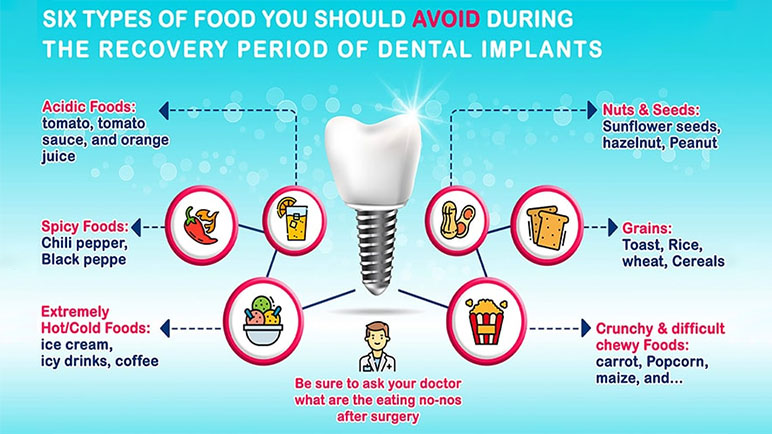
Avoiding certain activities
Engaging in physical activity too soon after surgery can hinder healing and increase discomfort. It’s advisable to refrain from intense exercise or activities that raise your heart rate considerably during the initial healing period. Activities that lead to increased blood flow around the surgical site can exacerbate swelling and discomfort.
By respecting your body’s need for recovery, you create a pathway toward healing. Remember that prioritizing your well-being during this time positively influences outcomes, setting the stage for a successful dental implant experience.
Choosing a qualified dental professional
The success of your dental implant procedure hinges significantly on the expertise and skill of the dental professional performing the surgery. Selecting a qualified provider is an essential step in your journey toward a restored smile.
Importance of experience and expertise
Dental implant surgery requires specialized training and skill. A practitioner with extensive experience in placing dental implants is likely to achieve more favorable outcomes and minimize potential complications. Researching the qualifications of potential dentists can lend peace of mind as you embark on this transformative process.
Seek out professionals who are board-certified or who have completed advanced training in implant dentistry. Their proficiency can greatly influence your experience, helping to alleviate concerns surrounding pain, discomfort, and overall satisfaction with the results.
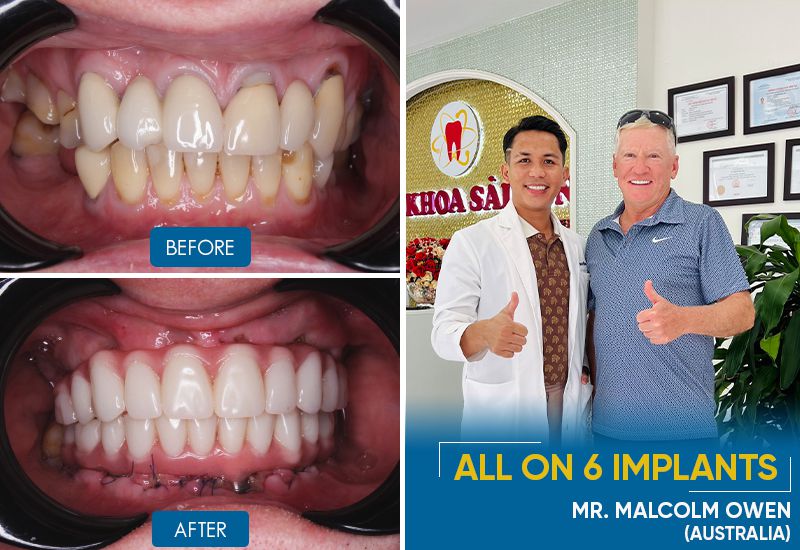
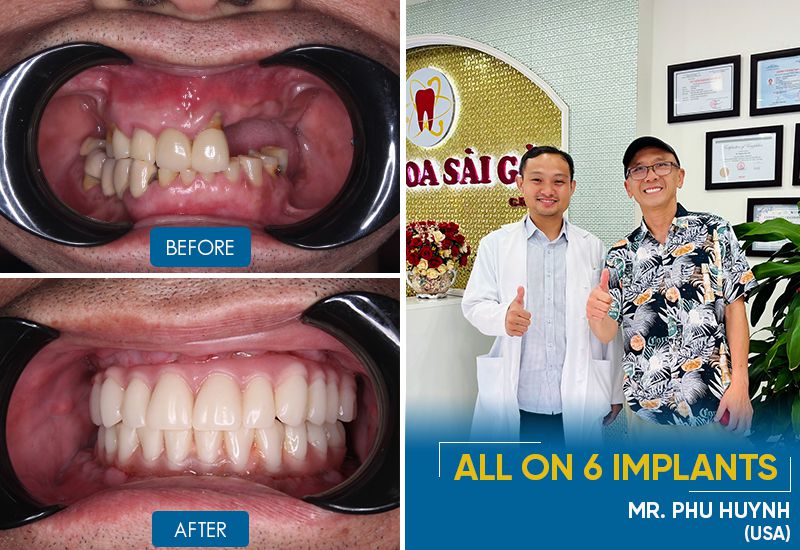
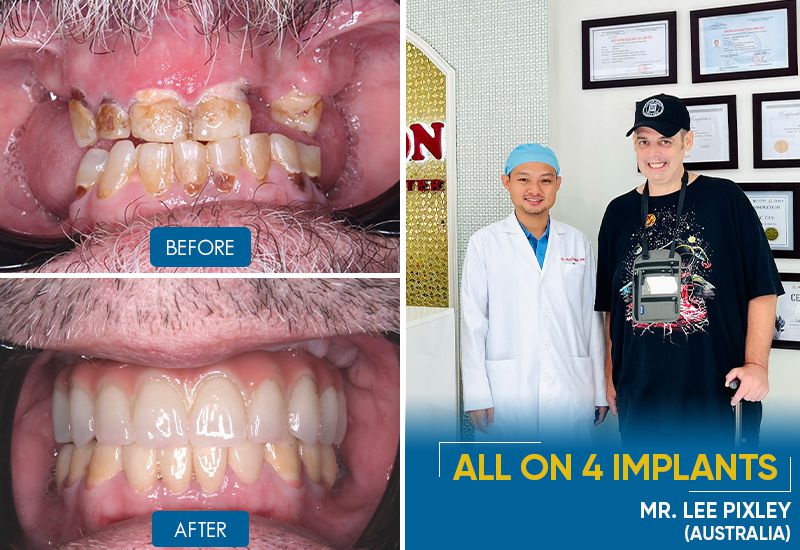
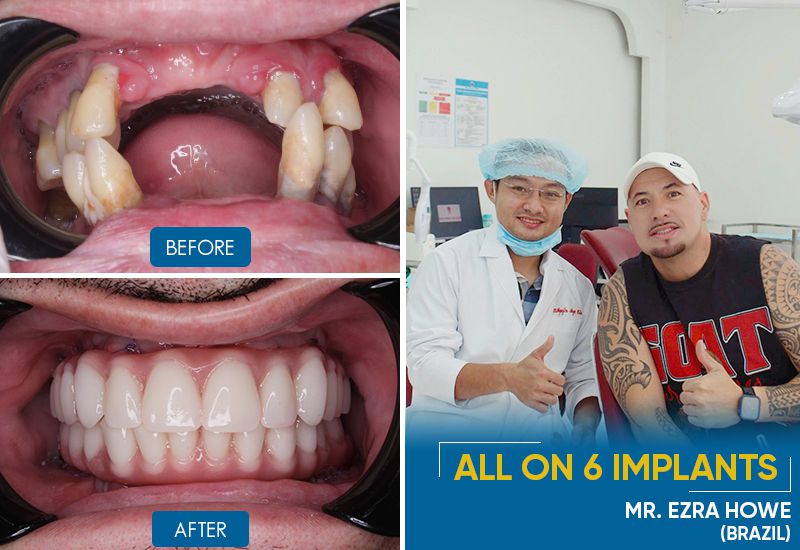
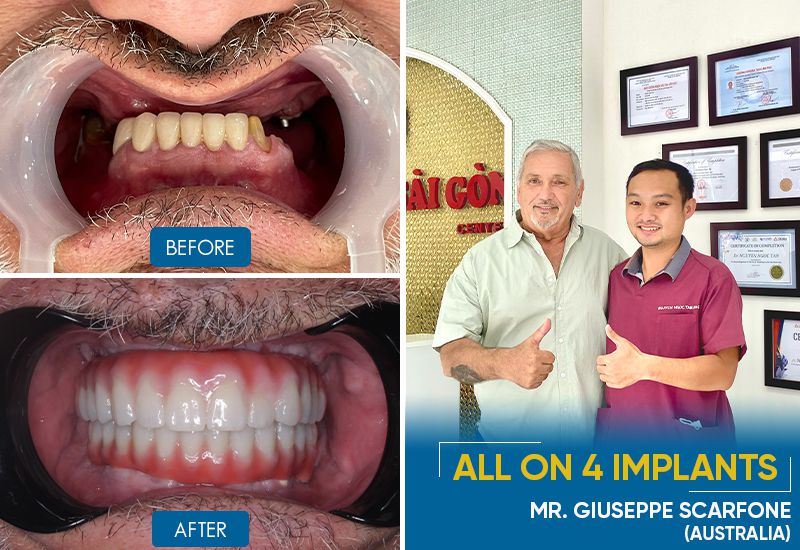
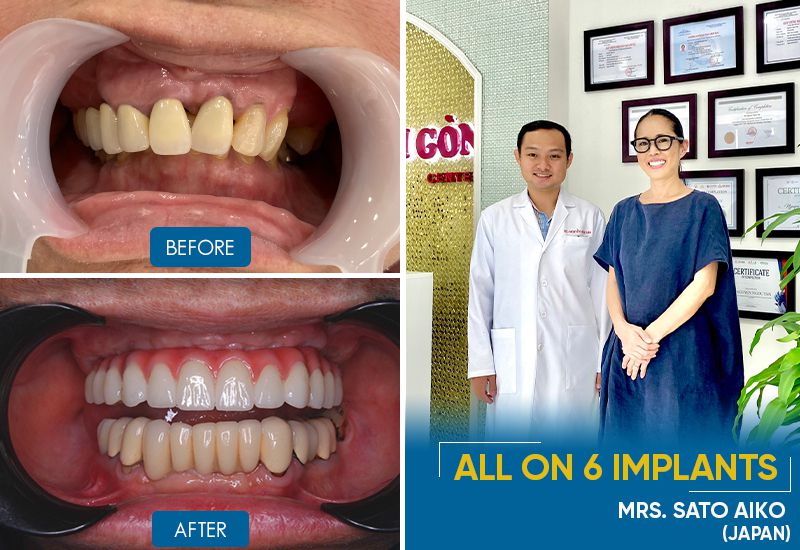
Checking credentials and reviews
Before committing to a dental professional, it’s wise to conduct thorough research. Investigate their credentials, educational background, and any additional certifications related to implant dentistry. Furthermore, reading reviews and testimonials from past patients provides valuable insights into the quality of care offered.
Don’t hesitate to schedule consultations with multiple practitioners to assess their approach and communication style. Engaging in discussions about your needs, expectations, and the procedure itself can help establish a rapport and build trust, crucial components for a successful dental implant experience.
Here below is Saigon Dental Implants Center’s reviews from our customers:






Conclusion
Dental implants represent an excellent solution for replacing missing teeth, offering a durable and aesthetically pleasing outcome. While the procedure does involve surgical intervention, modern advancements in anesthesia and pain management ensure that the experience is largely comfortable.
By understanding the factors influencing pain levels, following post-operative instructions diligently, and choosing a qualified dental professional, you can minimize discomfort and optimize your recovery. Remember that any discomfort you may experience is temporary and part of the healing process. With proper care and attention, you can look forward to a successful outcome and a healthy, beautiful smile.

 Google Reviews
Google Reviews Call
Call
SAIGON IMPLANT CENTER
Best dentist in Vietnam
Saigon Implant Center - Dental Clinic utilizes the latest technology for specialized treatment in the field of Single implant, full jaw implants, All on 4 implants, All on 6 implants, Zygoma implant....
SAIGON IMPLANT CENTER
Best dentist in Vietnam
Saigon Implant Center - Dental Clinic utilizes the latest technology for specialized treatment in the field of Single implant, full jaw implants, All on 4 implants, All on 6 implants, Zygoma implant....